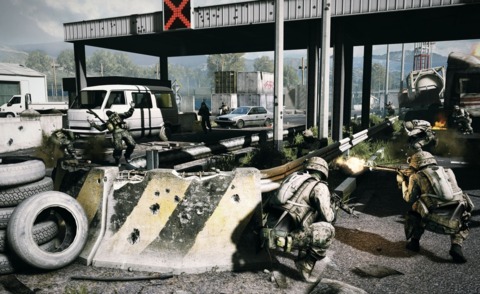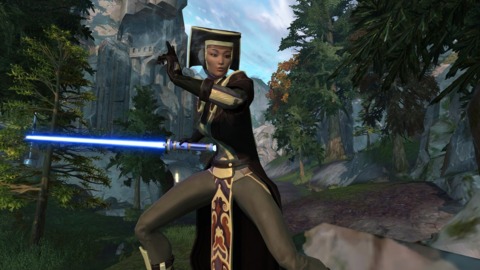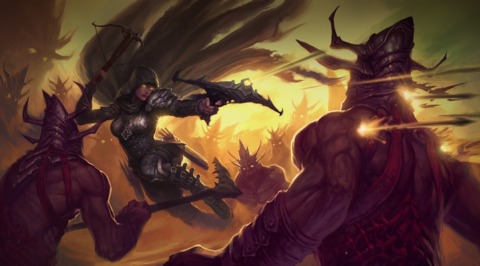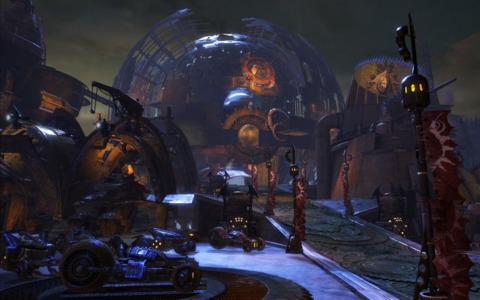The State of PC Gaming
PC publishing and development luminaries share their thoughts on the current state of the PC gaming platform and where it's heading.

Whether it's the rise of indie games, the growing popularity of digital downloads, or the sheer horsepower or creativeness of its community, it's undoubtedly a good time to be a PC gamer. We spoke with several prominent members of the PC development world while at Gamescom to get their thoughts on the current state of gaming on the PC platform, the biggest hurdles it faces, and where it's going.
Karl-Magnus Troedsson, general manager, DICE
How does the European PC gaming market compare with the Asian and North American markets?
First and foremost, and this is based more on feeling than actual numbers, but I would say it's bigger. PC gaming is really big in Europe compared especially to North America. I'm unsure of Asia, but I can guess that PC gaming is quite big in South Korea, for example. Our general feeling is that our Battlefield community on PC is definitely the largest in Europe, which is something we're very proud of.
How would you say the taste in genres compares in Europe and North America?
It's pretty similar. PC players around the world probably play very similar games. There are a lot of massively multiplayer online games and shooters; those are probably the two biggest genres, except for the whole free-to-play and Facebook spectrum of games.
What would you say is the biggest threat to PC gaming?
In light of recent events, not just gaming but everything, hacking is one of our biggest problems. I think every company out there is arming themselves to the teeth when it comes to security. It's natural for a company to gain its credibility and take care of a person's credit card. The problem is that if [hacking] keeps increasing, then this will perhaps take focus away from making the best games and services possible. That's definitely a threat, one way or another.
I understand where people come from with this whole anarchy; everything should be free kind of situation. I think a lot of us who work in the game industry were hackers from the beginning. Some people hacked code and they managed to get into the games industry. There's definitely some kind of connectivity between the subcultures or whatever you want to call it, but the problem here is that we want to focus on making the best games we can. Let me give you an example. We're working on Battlefield. We're spending a lot of our time just fixing problems that have to do with hacking our game, people creating cheats, or people ruining the game for others because they have aim bots…all the kind of crazy stuff people can come up with when they reverse engineer a game.

"In light of recent events, not just gaming but everything, hacking is one of our biggest problems."
I can see the pride people take in this because they will learn a lot from it, but they're ruining the experience for a lot of people. That makes me a bit sad. We want to create entertainment that people enjoy, but instead, we have to spend time focusing on the bad parts of it, which we will do, of course. It's part of our responsibility, but if that would magically go away, it'd be a good thing for the whole industry.
The second thing: I still believe piracy is a big problem for us even though the public discussion has disappeared a bit. So far, Battlefield has been unaffected by it because we have a multiplayer online game where you need to be logged in, so we haven't had any huge problems with it. We've had other titles that have been hit hard by it, so piracy is still a problem. I'm not advocating draconian DRM solutions. I don't believe that's the best way to do it. I'd rather have people buy our games, direct to consumer through different e-tailer solutions. And then by doing that, they should get something more in the game. I don't know…it could be early access or a boost pack for free or something like that. But piracy is definitely still a problem.
Where do you see the PC gaming industry in five years?
I think PC gaming is going to explode. Battlefield was founded on PC, so we feel very close to the PC community. With Battlefield 3, we've chosen to make our main SKU the PC version. Not that we're giving any less love to the console version, but the PC version needs to be true to its PC roots, and that's why we have PC-specific features, like 64 players. That in combination with the rise of e-sport community is something that we strongly believe in as well. This is the future. We have e-sports on consoles as well. I'm not dissing that in any way, but PC is probably the major platform for the e-sports community. And this is just starting to grow from being a subculture to becoming something much, much bigger. That's definitely going to be a kick-starter for PC gaming.
There's also the fact that the PC gaming platform itself is getting so powerful that you can do a lot more on it than the consoles. I'm not saying the console cycle is ending in any way, but it's getting toward the end. We're getting close to the limit of what we can do. We know that there's more power to find when we do more optimizations and when we have smarter solutions. We know by the end of console cycles that the games that were shipped at that time looked a lot better than games that were launched at the beginning of the cycle, and we're going to see that here as well. The closer we get to the end of the cycle, the games are going to run smoother, look prettier, and sound better. The fact that the PC platform can do so much more now…in five to 10 years, it's hard to imagine what you can do on the PC.
I would also argue that Apple is a force to be reckoned with because of their platforms. We don't have such a big core following there because they sell a lot of machines, but not all of them are powerful iMacs or the higher-grade machines. But I definitely think they are really catching up here, and I think we're going to see increased sales of their powerful machines. And when they get into a state where people want to play not ported games but ones that are native to their platform, I think that's going to help diversify this kind of gaming. For us, as developers [working on] the PC and Apple platforms, the Apple platform is actually easier because you have the same input device. Naturally, it's going to be a big challenge for us to get it running on a different operating system, but that aside, it's the same input devices.
There's one other thing I will point out as well, and it's a reason why I believe in the PC's future, and it's what I like to call the rise of the indie developer. I work for DICE, and we're a part of EA, but I'm really happy to see that there are so many indie developers that grow from being in a garage with one to two guys into a proper developer. The power that they now have to self-publish and do all of these kinds of things means the diversity of games on the PC is going to grow exponentially. It's going to explode. You might even argue it already has exploded. And this goes for the PC and Apple's platform too. This will probably happen more on the console as well, but it's a bit harder for a new developer to get in there and start doing things. The rise of the indie developer on the PC is definitely going to lead the way for this as well…to gain more people and accumulate more players on the PC platform.

Gabe Newell, managing director, Valve
How does the European PC gaming market compare with the Asian and North American markets?
It's sometimes really hard to tell what the differences are between various markets. We've certainly never been able to make good decisions and say we're targeting this market or this demographic over another. We always tend to be a little bit surprised. If you look at the relative mix of PC versus console with a game like Left 4 Dead, it was more console than we would've predicted. Portal 2 ended up being more PC than we would've predicted. So, it's a little hard to see significant differences. There tend to be a lot of myths told in our industry about why one game is popular with one audience or another. The longer we're in the business, the more we just say "build good games and gamers are going to like them." Other than that, we can't make any decisions that would steer us one way or another.
What's the biggest threat to the PC games industry?
Well, right now, the PC gaming industry is just doing gangbusters. If you look at our business, it's growing hugely. Our business has always grown really well. We continue to be startled by just how much the PC side of our business has grown. What's going to be true about the PC industry is that where it's successful is going to surprise the people who are already in the business…that it's not predictable. If it were, then everyone would go off and do that. Nobody would've predicted Zynga before Zynga actually happened. What they're doing is astonishing.

"Nobody would've predicted Zynga before Zynga actually happened. What they're doing is astonishing."
The biggest threat is the fact that we need leadership in the PC industry. The strength of the industry is the lack of any sort of authority that insists that everything be done this way…that you have to follow these criteria or go through this approval process. That's also the weakness. It makes it hard for new technology to achieve critical mass, so it's really useful when different companies can take those risks on and push those things forward. But if nobody does it, then we're going to languish and end up having proprietary closed systems that can use that to their advantage over the energetic chaos of the PC.
Where do you see the PC games industry in the next five years?
That's always a suicide mission to try to answer that question. You always end up saying stuff that has nothing to do with what happened. There are certain things that you can plan on. Five years from now, PCs will be 32 times as fast. Graphics hardware will be 100 times as fast. We'll have gigantic memory storage. We'll be seeing 50-plus gigabyte memory systems. Networking will be getting faster, but it will be getting faster slower than the client. And that will cause more people to put more intelligence at the edges of the network instead of centralizing it. These are just the long-standing things that have been true for 30 years; identifying them is not any sort of huge leap.
What people do with it…that's the interesting question. What new opportunities does that open up? What kind of form factors emerge? We're looking at really interesting technologies related to biofeedback. We're looking at new ways of presenting information to the user. We think that some of them are super attractive and critically important. But all we know is that for each success, there will be nine failures and to always focus on paying attention to what your customers care about because they're the best chance for you and your company to avoid going down a rat hole.

Dr. Ray Muzyka, cofounder, BioWare
How does the European PC gaming market compare with the Asian and North American markets?
I think all of them are pretty vibrant and growing rapidly. The illusion that PC games have shrunk in size is just that because there's a lot more digital and online gaming now…a lot more online sales, a lot of opportunity in the social space, the browser space, and the light massively multiplayer online space. I think there are different flavors of games in all the territories, but in all of them, the PC market is pretty vibrant, and I see it as a really exciting opportunity.
Would you say there are any genres that are predominant over here [Europe] compared to North America?
Well, I think that's another point of difference. There's a flavor of different kinds of games that are more popular in some territories than others. I always find it really interesting to look at the sales charts on a regional basis for Germany, France, and the UK versus Asia and North America. You see certain trends. You see strategy games and role-playing games are very popular in Germany, as well as sports games like FIFA and so on. It's a good market for BioWare and EA. A lot of the games we develop across the portfolio resonate strongly with the European gamer, so it's a very important market for us.
What do you see as the biggest threat to PC gaming?
It's changing rapidly. The online connectivity presents a lot of opportunities and presents challenges as well in understanding what the audience wants in a connected world. We're approaching that in a few ways. On the one hand, we're building interoperability between our platforms so that there's persistence and a reason to play on multiple platforms; that can be a social experience, a browser experience, a console experience, or a PC experience. Being connected in an online world allows you to have different platforms that have IP universes that all connect together. And there's still a place for really epic PC games, speaking specifically to the PC market, and that can be MMOs, a free-to-play title, or a stand-alone experience. There are examples of all those that have done well in recent times, and I think they'll continue to do well. What has changed is that the consumers are approaching the market differently in how they acquire products and how they play them. The opportunity, or the challenge, is embracing what the fans want, going where they are, and trying to build products and games that accommodate what they want.
Where do you see the PC gaming industry in the next five years?
It will continue that trend of interoperability and the connected experience. That's more and more a trend where we allow players--wherever they are--to play how they want, where they want, what they want, and in the way they want. Enabling different versions of a product or extensions of an IP universe or franchise to exist and thrive on different platforms is really important whether that be a social platform, browser, PC, console, or mobile experience. They're all relevant, and I think they're all going to be very important and will grow rapidly in the future.

"The opportunity, or the challenge, is embracing what the fans want, going where they are, and trying to build products and games that accommodate what they want."
Dr. Greg Zeschuk, cofounder, BioWare
How does the European PC gaming market compare with the Asian and North American markets?
I can't say that I have huge insight into the market here, but one thing I do notice is that there's a lot more smaller and more unique games that come out of here. A lot of small teams will make something cool and release it locally on PC. We see a lot of downloadable games here. There's just a lot of ground-level stuff, whereas in North America, the PC games tend to be those big, really heavy duty ones.
What's the biggest threat facing PC gaming?
I'm really bullish on PC gaming. Honestly, it's probably the biggest platform. It's the most successful platform. As we move into a world where the business model is all about digital downloads and direct accessibility, it's the easiest, fastest, simplest one to enjoy. And, not that it's a challenge per se, but I think mobile is going to be really strong. Frankly, our mobile phones are starting to look a lot like PCs these days with their own screen. That's going to be one of the interesting challenges going forward…how [these two platforms] mesh together. But the PC is doing awesome.
Where do you see the PC gaming industry in the next five years?
I think it's mobility. One thing that's really interesting is the range of games out there right now. There are full, regular-purchase games. There's premium, and there's also free to play and Facebook gaming. There's continuous growth in all of those areas, and I think they're going to be huge.

Frank Pearce, executive vice president product development, Blizzard
How does the European PC gaming market compare with the Asian and North American markets?
The biggest difference for the European market versus the Asian and North American markets is the number of languages we publish our game in and having the market split up across so many countries. In North America, it's primarily the US. In Asia, it's primarily China, although Korea and Taiwan are important to us there as well. But all of the countries in Europe are equally important to us, and they all have different needs and requirements in terms of ratings approvals and all that sort of stuff.
The European market is very similar in terms of its expectations to the US and in terms of the business model. But I think the European market--the size, scope, and importance of it--can be seen at Gamescom. The excess of 200,000 people from around the continent converging in one place to see what's going on in the gaming industry is pretty telling.

"Those are all potentially PC gaming customers, especially the tens of millions of people playing games on Facebook. "
What's the biggest threat to the PC games industry?
Well, you can view it as a threat or you can view it as an opportunity, but there are all kinds of new platforms emerging as gaming platforms that people are enjoying interactive entertainment experiences on--whether it's iPhones, tablets, or social networks like Facebook. Those all potentially represent a big threat to the PC gaming market, but at the same time, if you look at some of the games on Facebook, they have 80 million people that have played these games. Facebook has 500 million [and counting] active users. Those are all potentially PC gaming customers, especially the tens of millions of people playing games on Facebook. There's an opportunity for PC games publishers to bridge the gap and leverage that as something where people are first exposed to gaming through Facebook and they're able to make the transition to the more immersive and hardcore experience on the PC.
Where do you see the PC games industry going in the next five years?
It's tough to predict where everything is going to be just a couple years from now, much less five. But, we're talking about social networks, like Facebook, and I think people that are using the PC and game players that are using the PC are going to, more and more, have an expectation of connectivity with information. The most important thing we're going to see in PC gaming is a constantly connected networked experience for people because they are discovering how important their connections to their friends and family are.
Fredrik Wester, CEO, Paradox Interactive
How would you say the European PC gaming market compares with North America and Asia?
The Asian market is mainly driven by free to play online gaming. The North American and European market have a high percentage of traditional PC gaming with the North American market being driven mainly by download. The trend is obviously towards more free to play and browser based games in Europe and North America as well.
What do you see as the biggest threat to PC gaming?
I see only opportunities in the PC gaming scene however the stage will change in the coming years with browser gaming, streaming and intelligent TVs. A challenge for all gaming companies will be to keep on being innovative and catch the interest from the gamers.
Where do you see the PC gaming industry moving in five to 10 years?
Streaming will have a great impact and the opportunities for independent game companies to grow has never been bigger, so I expect the coming five to 10 years to be the most innovative in the history of gaming. Go indies!

Eric Flannum, lead designer, Guild Wars 2
How does the European PC gaming market compare with the Asian and North American markets?
For us and our experience, the original Guild Wars was immensely popular in Europe. At least half of our audience is basically in Europe, and I think that number grows all the time, so Europe is incredibly important for us. Asia also, if you're talking Korea and China…those are immense markets that are difficult to break into sometimes for a Western game. But it's a challenge we're looking forward to cracking.
How would you say the expectations of those territories differ?
We've actually done a little bit of research on this. We sent team members to Korea to try to poll Korean gamers, and I think the differences are not that great. The similarities are actually much more prevalent than the differences. For example, Korean games get a really bad wrap of, "Well, Korean gamers really like grind." We found out that that's not actually true. We go talk to Korean gamers and they don't like grind anymore than Western gamers do. It's basically: This is what they're given to play and these are their options. You can see the evolution of these games from Lineage II to AION to Blade and Soul, which NCSoft is coming out [with], and you can see this distinct reduction in the amount of grind that these games are asking players to do. And I think maybe they're coming at it slower. They want a lot of the same things that the Western markets want.
What's the biggest threat to the PC games industry?
I'm assuming a lot of people answered consoles to that…I don't think so. I'm not sure if there is a threat to PC gaming actually, to be quite honest. PC gaming has morphed a lot from what it used to be, but I don't think it's any smaller. We come here to Gamescom or you look at Steam, and you look at the number of games that are releasing on Steam, and it's like, "PC gaming seems to be doing pretty well." The biggest threat is people running around saying PC gaming is [dead], but I think it's really just a matter of PC gaming shifting and changing its focus.
It's going to smaller games, which is actually really cool because I know a lot of developers feel they're delving into these smaller studios and they're developing games for the handheld market. Then those games get ported onto the PC and they find completely new audiences. They're able to take a lot of risks, and we see that not only in PC gaming but in handheld and also with things like XBLA. We see things like Bastion or From Dust or Trenched. When you look at what Double Fine has done, it makes you say, "Hey, that's super cool; you're able to make games that at a larger [studio] would say "maybe that's a little too niche," to. That's really healthy, and I think it's great that people are able to experiment and invent new things.
Where do you see the PC games industry in the next five years?
I think where it's going is more diversity. We can take a team of 10 or 15 people, and with digital distribution being what it is, you don't need a giant monetary or development push behind [a game]. At the same time, you're also going to see those megagames that come out; you're going to see the giant games like the one I'm working on right now [laughs]. But it's great when you can get a game that's made by one guy, like Minecraft, and you can get a game that's made by a 275-person company, like ArenaNet. And we can keep innovation involved with those games and we can see people trying to do things a little differentially. I think that's very healthy for PC gaming. And the thing that I will hopefully see, and the thing that I think we're seeing, is people take more chances. Regurgitating the same thing over and over again is just not what's going to excite people.
Got a news tip or want to contact us directly? Email news@gamespot.com

Join the conversation